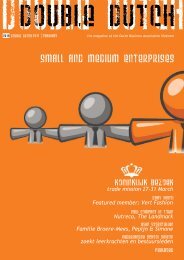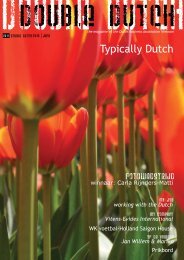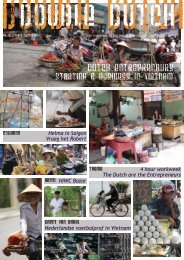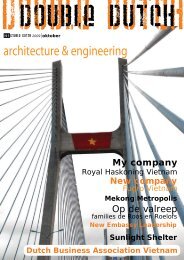Op de valreep, - Dutch Business Association vietnam
Op de valreep, - Dutch Business Association vietnam
Op de valreep, - Dutch Business Association vietnam
You also want an ePaper? Increase the reach of your titles
YUMPU automatically turns print PDFs into web optimized ePapers that Google loves.
working agricultural counsellor<br />
rubert workin konijn<br />
with what the <strong>Dutch</strong> would call a<br />
“little white lie”. Two examples:<br />
one applicant wanted me to use<br />
the latest updated version of<br />
her CV. It turned out that in this<br />
version she combined a mere 4<br />
months working experience with<br />
one employer with a much longer<br />
working experience with another<br />
employer, to make the CV look<br />
better. The interesting part was<br />
that she told me this without any<br />
scruples when I “confronted” her<br />
with this.<br />
Another applicant, who accepted<br />
a job with one of our clients,<br />
informed us that she told her<br />
boss she would be moving back<br />
to her hometown to take care of<br />
her grandmother. She did this out<br />
of respect for her boss. Because<br />
he was such a great guy, she was<br />
afraid that if she told him that she<br />
had accepted a better job, she<br />
would break his heart. So, the<br />
“flexibility” often comes from a<br />
good heart!<br />
Job hopping<br />
Sometimes people talk about<br />
job hopping in the Vietnamese<br />
market as though this is typical<br />
of the Vietnamese. I don’t<br />
personally think that Vietnamese<br />
employees are more frequent<br />
hoppers than other employees<br />
in a similar market. What I do<br />
think is that Vietnamese people<br />
are much more sensitive to their<br />
working environment and that<br />
they distinguish less between<br />
work-life and private-life.<br />
Mainly in middle and higher<br />
positions, a negative working<br />
environment (e.g. a bad boss)<br />
is specified as the reason for<br />
changing jobs. Individuals in<br />
junior levels find salary increases<br />
more appealing and therefore are<br />
more likely to leave their jobs for<br />
this reason.<br />
My name is Rubert Konijn, I<br />
am Agricultural Counsellor<br />
at the Netherlands Embassy<br />
in Bangkok, Thailand and<br />
responsible for agricultural<br />
relations with Vietnam.<br />
Together with the Consulate<br />
General in HCM and the<br />
Embassy in Hanoi we try<br />
to promote tra<strong>de</strong> and<br />
investments in the field of<br />
agriculture.<br />
More than half of the people<br />
of Vietnam are <strong>de</strong>pendant on<br />
agriculture. Agriculture has a<br />
contribution to GDP of around<br />
20% and is a significant source<br />
of foreign income through<br />
export. We try to promote tra<strong>de</strong><br />
and investments by organizing<br />
tra<strong>de</strong> missions, matchmaking<br />
and seminars. We also advise<br />
on aid programmes related<br />
to agriculture and negotiate<br />
market access problems with the<br />
Vietnamese government. At the<br />
moment we are conducting a<br />
study into the different agri/food<br />
opportunities in Vietnam together<br />
with Rabobank agribusiness<br />
research.<br />
The Netherlands is the second<br />
largest agricultural exporter<br />
in the world, export from the<br />
Netherlands to Vietnam is<br />
substantial. However, agricultural<br />
imports from Vietnam are four<br />
times higher and very interesting<br />
for <strong>Dutch</strong> companies.<br />
The Netherlands imports fish,<br />
coffee, pepper and cashew nuts<br />
from Vietnam. Fruit, vegetables<br />
and cocoa imports are rising.<br />
Total agriculture imports were<br />
235 million euro in 2007, an<br />
increase of more than 20%<br />
with the year before. These big<br />
increases causes some concerns<br />
as well. There are concerns about<br />
the quality of the agricultural<br />
products and the huge expansion<br />
of, for example, coffee growing<br />
and Pangasius farming. To tackle<br />
some of these problems we have<br />
set up Public Private Partnerships<br />
in fisheries, cocoa and coffee.<br />
Through these Public Private<br />
Partnerships we try to increase<br />
the export of sustainable<br />
produced agricultural products<br />
to the EU. Companies in the<br />
Netherlands have a genuine<br />
interest in producing in and tra<strong>de</strong><br />
with Vietnam.<br />
Private companies, governments<br />
and NGO’s have the same<br />
interest and try to solve issues<br />
that may affect tra<strong>de</strong>. From<br />
2004 on we have experience in<br />
the fish industry and for the last<br />
year with cocoa and coffee. To<br />
name a few examples: we have<br />
trained Vietnamese in <strong>de</strong>tecting<br />
antibiotics and other residues<br />
in fish, we have been asked by<br />
the Vietnamese government to<br />
make an Environmental Impact<br />
assessment of Pangasius Farming<br />
in the Mekong and to help<br />
<strong>de</strong>veloping the national strategy<br />
to increase ten times the cocoa<br />
production in Vietnam.<br />
These are just a few examples<br />
of the interesting and promising<br />
cooperation between the<br />
Netherlands and Vietnam in<br />
the field of agriculture. Should<br />
you have any further questions<br />
or suggestions, please do not<br />
hesitate to contact the Hanoi<br />
Embassy or our Bangkok office:<br />
Rubert Konijn<br />
Counsellor for Agriculture, Nature<br />
and Food Quality for Thailand<br />
and Vietnam<br />
Embassy of the Netherlands,<br />
15, Soi Tonson, Ploenchit Road<br />
Bangkok, Thailand<br />
ban-lnv@minbuza.nl<br />
www.mfa.nl/ban<br />
phone: +66 2 3095290<br />
DOUBLE DUTCH 2008│5 9







